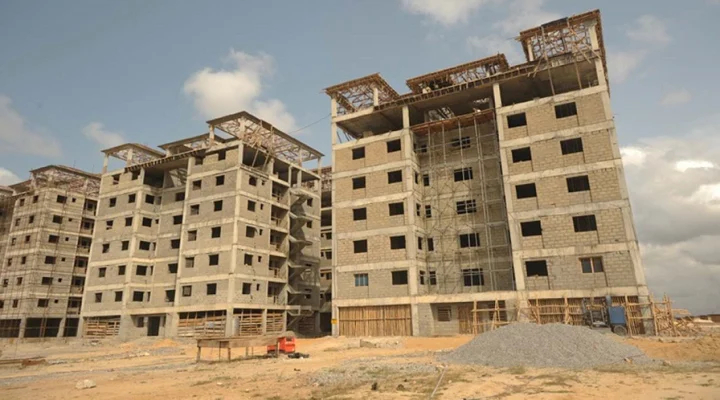Nigeria’s housing sector is facing heightened turbulence as foreign exchange (FX) volatility and rising inflation continue to stifle growth, putting the dream of affordable housing further out of reach for millions of citizens. Despite efforts by the government and private developers to expand access to housing, the sector is buckling under the combined weight of surging construction costs, high interest rates, and weakened consumer purchasing power.
In recent months, the naira’s persistent instability in the foreign exchange market has worsened the situation for developers and contractors who rely heavily on imported building materials. Key inputs such as cement, steel, tiles, roofing sheets, and finishing products are increasingly priced in dollars, making housing projects more expensive to execute. The volatility has forced many developers to either suspend projects, adjust delivery timelines, or pass on costs to buyers, further widening the affordability gap.

Inflation, which has remained stubbornly high, has also compounded the crisis. With headline inflation above 30 percent and food inflation eroding household incomes, fewer Nigerians can afford mortgages or lump-sum payments for new homes. For middle- and low-income earners, the soaring prices of essential commodities mean that homeownership is becoming a distant dream. This has slowed demand in the formal housing market, leaving developers struggling to sell units even as costs escalate.
Experts note that the ripple effect of these economic headwinds is far-reaching. The housing deficit, already estimated at over 28 million units, risks deepening further as fewer projects are completed. The construction sector, one of the largest employers of labour, has also suffered job losses as companies downsize to stay afloat. Small-scale artisans, labourers, and suppliers are feeling the pinch, amplifying the social and economic costs of the crisis.
Mortgage financing, which should ordinarily cushion the impact, has not been spared. Commercial banks and mortgage institutions have been wary of lending amid rising default risks and high interest rates. Lending rates hovering around 25–30 percent have made mortgage products unattractive for the average Nigerian, whose disposable income is shrinking. The result is a near-collapse of the mortgage market, which is essential for driving sustainable housing growth in any economy.
Stakeholders in the housing and real estate industry have expressed concern that unless urgent interventions are implemented, Nigeria may fail to meet its targets under the National Housing Policy. The policy, which seeks to address affordability and access gaps, is being undermined by macroeconomic instability. Developers argue that while government-led initiatives such as the Family Homes Fund and low-cost housing schemes exist, they are insufficient to match the magnitude of the deficit.
Industry analysts say the government must urgently address FX liquidity issues to stabilise the naira, particularly because the construction sector depends significantly on imported inputs. They also recommend incentivising local production of building materials to reduce the sector’s exposure to exchange rate shocks. Already, local manufacturers of cement and steel face high energy costs and inconsistent power supply, which inflate their operating expenses.
Inflation control is another critical step. Without easing price pressures, disposable incomes will continue to shrink, further weakening demand. Analysts argue that tackling food inflation and stabilising the energy market could indirectly improve affordability in the housing sector, as households would have more financial room to consider housing investments.
On their part, real estate developers are exploring new models to cope with the crisis. Some firms have adopted flexible payment structures, including rent-to-own schemes and cooperative financing, to make housing more accessible. Others are increasingly turning to public-private partnerships (PPPs) to deliver affordable housing at scale. However, experts warn that without macroeconomic stability, these innovations may not achieve the desired impact.
The government has also been urged to strengthen regulatory frameworks to ensure transparency and investor confidence. With real estate traditionally viewed as a safe investment, instability and rising costs risk discouraging both local and foreign investors. Addressing issues such as land titling, bureaucracy in approvals, and high transaction costs could improve efficiency and attract much-needed capital.
There are also calls for increased intervention by development finance institutions. The Federal Mortgage Bank of Nigeria (FMBN) and the Nigeria Mortgage Refinance Company (NMRC) have a critical role to play in deepening access to affordable mortgage financing. Expanding the National Housing Fund (NHF) and ensuring better management of its resources could also provide more opportunities for Nigerians to access home loans.
While the housing sector is grappling with immense challenges, stakeholders remain optimistic that with coordinated policy reforms, it can still serve as a catalyst for economic growth. Globally, real estate and construction sectors are known to stimulate job creation, boost local industries, and contribute significantly to GDP. For Nigeria, unlocking the sector’s potential could also help reduce poverty and inequality by providing more citizens with secure shelter.
However, time is running out. With the housing deficit expanding annually and population growth projected to keep rising, the need for urgent reforms cannot be overstated. Unless FX volatility and inflation are decisively tackled, Nigeria’s housing sector risks becoming one of the biggest casualties of the ongoing economic crisis, deepening the hardship of millions of households and undermining national development goals.
Support InfoStride News' Credible Journalism: Only credible journalism can guarantee a fair, accountable and transparent society, including democracy and government. It involves a lot of efforts and money. We need your support. Click here to Donate
